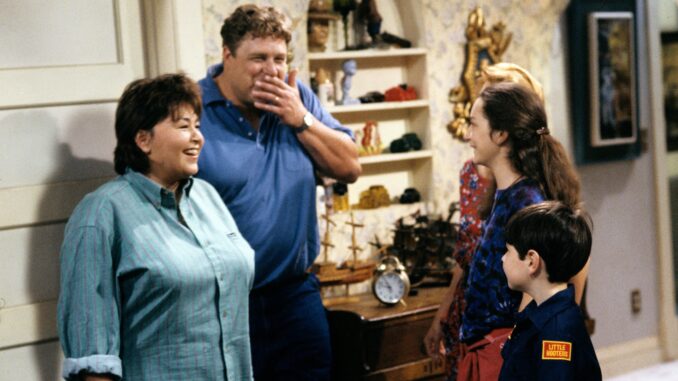
The Resurgence of Roseanne: A Cultural Phenomenon in Modern Television
The revival of Roseanne has taken the television world by storm, achieving astonishing ratings that reflect a deep-seated appetite for both nostalgia and relevant social commentary. The premiere episode drew an impressive 18.2 million viewers, with a notable 5.1 rating among the coveted 18-to-49 demographic. This success is particularly striking in today’s fragmented television landscape, where shows often struggle to find their audience.
A Ratings Juggernaut
The ratings for Roseanne’s revival are not just impressive; they are historic. In a time when network television faces myriad challenges, the revival’s numbers surpassed all expectations, even growing from the premiere to the second episode—a rarity in the industry. The 8:30 episode attracted 18.6 million viewers, making it one of the most-watched comedies in recent years. The only show to eclipse its viewership this season was a post-Super Bowl episode of This Is Us, demonstrating the cultural resonance of the Conner family during a pivotal moment in American history.
These ratings do not exist in a vacuum; they have had a ripple effect on ABC’s entire Tuesday lineup. For instance, Black-ish experienced its largest audience since its premiere in 2014, drawing 8.7 million viewers. This phenomenon, often referred to as the “Roseanne halo effect,” illustrates how the revival has reinvigorated interest in traditional network programming.
Engaging with Contemporary Issues
One of the most compelling aspects of the Roseanne revival is its direct engagement with the political landscape that has shaped contemporary America. The show has tackled the divisions created by the 2016 presidential election head-on. The character of Roseanne Conner, who has evolved from a leftist icon to a vocal Trump supporter, exemplifies how political beliefs can fracture familial bonds. This dynamic is poignantly illustrated in the interactions between Roseanne and her sister Jackie, who reflects a more liberal viewpoint. The line “What’s up, deplorable?” captures the tension that many families have experienced in today’s polarized political climate.
While many shows have attempted to address political themes, Roseanne stands out as the only series that explicitly engages with the realities of how the election has affected familial relationships. The show’s willingness to delve into such contentious issues, while still delivering humor, showcases its relevance in a rapidly changing cultural landscape.
Revivals and Reboots: A New Trend
The success of Roseanne comes at a time when television is saturated with revivals and reboots. Despite the prevailing sentiment that audiences are fatigued by such trends, the ratings speak volumes. NBC’s revival of Will & Grace, which premiered to 10 million viewers, further validates the notion that there is a significant demand for familiar characters navigating current societal issues.
These revived sitcoms resonate particularly well with audiences because they offer a lens through which to view contemporary challenges. The characters become relatable figures who reflect the complexities of modern life, allowing viewers to connect with their stories on a deeper level. As television comedies often tackle current events more effectively than dramas, they serve as a cultural barometer, providing commentary on the zeitgeist.
The Legacy of Roseanne
The original Roseanne changed the landscape of television when it premiered in 1988. It was one of the first sitcoms to portray a working-class family with authenticity and depth, tackling issues such as economic hardship, gender roles, and health crises. The revival not only pays homage to this legacy but also repositions the Conners within the context of today’s societal challenges.
Interestingly, Barr’s personal evolution mirrors that of her character. In her earlier career, she expressed reluctance to be associated with Roseanne Conner, feeling typecast. However, her return to the role reflects a reconciliation of her identity as both a performer and as a cultural figure. The revival offers Barr a platform to explore her own experiences while resonating with audiences who have followed her journey for decades.
The Impact of Roseanne on Television Programming
The cultural significance of Roseanne extends beyond its immediate ratings success. It has sparked discussions about representation, social issues, and the role of television in reflecting American life. As networks seek to replicate the success of Roseanne, we may see a shift in programming that prioritizes authenticity and relatability over formulaic narratives.
The impending renewal of Roseanne for additional episodes seems almost inevitable given its strong performance. This renewal would allow the show to further explore the Conner family’s dynamics in a politically charged environment, offering audiences both laughter and thoughtful commentary.
Looking Ahead: The Future of Television Comedy
As Roseanne navigates its revival, it opens the door for other sitcoms to tackle contemporary issues with the same balance of humor and seriousness. The show demonstrates that there is a hunger for stories that engage with the complexities of modern life. Viewers are eager to see how beloved characters evolve in response to new challenges, and Roseanne fulfills that need effectively.
The revival also underscores the importance of television as a medium for cultural dialogue. In an increasingly polarized society, shows like Roseanne allow for exploration of divergent viewpoints, fostering conversations that might otherwise remain unspoken. The comedy format provides a unique platform for addressing difficult topics, making them accessible and relatable to a broad audience.
Conclusion: A New Chapter for Roseanne
In conclusion, the revival of Roseanne serves as a remarkable case study in the power of television to reflect and influence societal dynamics. Its astronomical ratings are indicative of a cultural moment that craves authenticity, humor, and connection in an increasingly fragmented media landscape.
As we anticipate the future of Roseanne, it is clear that the show has reestablished itself as a significant player in television history. Whether audiences love or criticize the series, its impact is undeniable. The Conner family continues to navigate the complexities of life in a way that resonates deeply with viewers, making Roseanne not just a revival, but a vital part of the ongoing conversation about contemporary American life.
